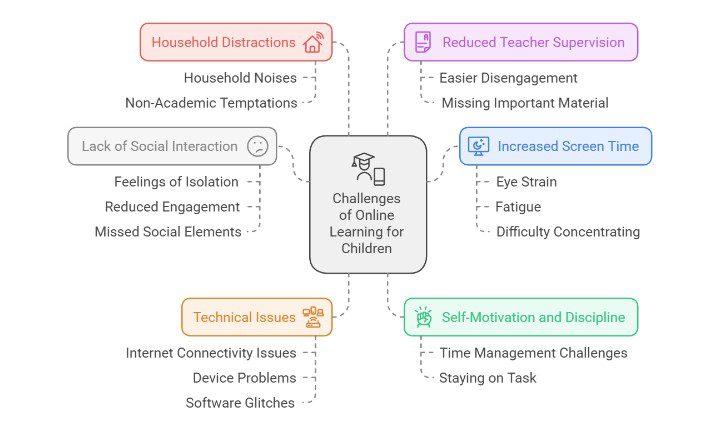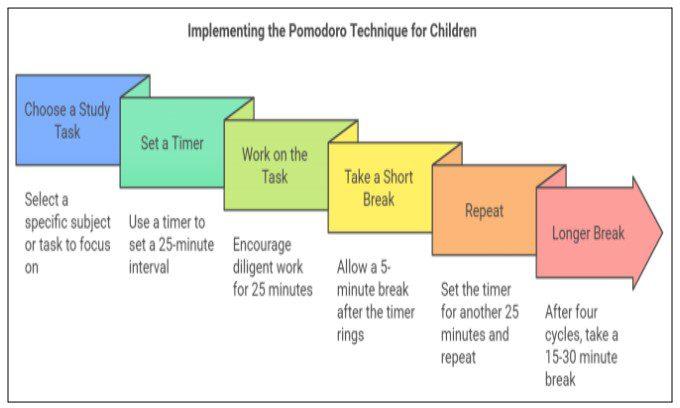Online learning has made education and learning accessible to students across the world. This style of learning has grown in popularity post the Covid pandemic and is a trend that’s here to stay. While the advantages of online learning are many, it does come with its own set of challenges
Unlike traditional classrooms, online learning presents a unique set of distractions that can disrupt concentration and hinder effective learning. If you’re wondering how to help your child improve their concentration, you’re not alone!
In this blog, we’ll explore six practical tips to boost your child’s focus during online classes, address common distractions, and provide insights to make online learning a rewarding experience.
Challenges for Children During Online Classes

Understanding these challenges is crucial in implementing strategies to enhance your child’s focus. Here are some actionable tips to address these hurdles.
6 Tips to Increase Focus and Concentration
1. Create a Dedicated Learning Space
A designated learning area like a classroom at home can make a significant difference in your child’s ability to focus. Choose a quiet, clutter-free space away from the main household activity areas, with minimal distractions. Ensure this area has good lighting, a comfortable chair, essential school supplies within reach, and most importantly a stable internet connection. When children have a specific space for studying, it sends a psychological signal that it’s study time, helping them mentally prepare for learning.
2. Establish a Consistent Routine
Routine is essential for building focus and discipline. Set a regular schedule that includes time for classes, short breaks, lunch, and some time for physical activity. A consistent routine not only makes it easier for children to settle into their studies but also helps reduce anxiety by providing a sense of stability.
3. Use the Pomodoro Technique

The Pomodoro Technique is a time management tool that can be incredibly effective for children. It involves 25 minutes of focused work followed by a 5-minute break. After four cycles, take a longer 15–30-minute break. This approach helps prevent mental fatigue, promotes sustained concentration, and allows kids to recharge in between study sessions. Use a timer to make it fun and engaging for younger children.
4. Encourage Regular Physical Activity
Physical activity is a great way to enhance focus and energy. Even a short walk, some stretches, or jumping jacks during breaks can help kids release pent-up energy and return to their studies with renewed concentration. Try incorporating short physical activities throughout the day, especially before challenging tasks. Exercise increases blood flow to the brain, helping boost memory, focus, and mood.
5. Limit Screen Time Outside of Classes
While online classes demand screen time, try to limit your child’s recreational screen time during school days. Encourage offline hobbies like reading, drawing, or playing an instrument to help balance screen exposure. Reducing extra screen time lessens the chances of digital fatigue, making it easier for kids to stay attentive during classes.
6. Break Tasks Into Smaller Chunks
Online classes can feel overwhelming, especially when assignments pile up. Help your child break down larger tasks into smaller, manageable steps. For instance, instead of working on a full chapter in one sitting, encourage them to read a few pages at a time. This approach makes the workload less intimidating and provides a sense of accomplishment with each completed step, keeping them motivated and focused.
Common Distractions and How to Tackle Them

1. Social Media and Messaging Apps
Social media and messaging apps are tempting distractions.
- Encourage your child to disable notifications and close all non-essential apps during school hours.
- Some productivity tools, like Focus Mode or Do Not Disturb, can help temporarily block notifications and restrict access to certain apps.
- Educating them on the importance of staying on task can help them make conscious decisions to avoid distractions.
2. Video Games and Other Entertainment Apps
Games and other entertainment apps can be a big temptation, especially when they’re just a click away.
- Set clear guidelines about when gaming is allowed, preferably after school hours or on weekends.
- Use parental control settings to limit access to these apps during study time.
- Offering small rewards for staying focused can also help reduce the urge to use these apps during school hours.
3. Household Noises
A busy household can be a source of constant distractions.
- Use noise-canceling headphones if possible, or try white noise or instrumental background music to help your child focus.
- Communicate with family members to minimize noise during class hours, creating a supportive environment that values the importance of learning.
4. Multitasking Temptations
Sometimes children try to multitask by checking emails, opening multiple tabs, or watching videos unrelated to their studies.
- Teach your child the value of focusing on one task at a time, as multitasking can reduce the quality of learning.
- Encourage them to keep only necessary tabs open and avoid browsing other sites during classes.
A Sneak-peek into a UCMAS online class
UCMAS is traditionally known for its in-classroom setup of abacus learning centers, where interactive and hands-on learning drives student engagement. However, due to high demand and a commitment to accessibility, we have recently launched online abacus classes as well. Here’s how UCMAS keeps students focused and engaged in our virtual environment:
- UCMAS creates a supportive and engaging learning environment by combining interactive methods with structured routines.
- As witnessed in the above video, each session is designed to keep children actively involved. Visual and hands-on activities with the abacus help sustain attention and enhance concentration.
- The abacus online classes have short, focused lessons, regular breaks, and a balance of individual and group tasks to maintain children’s interest and avoid screen fatigue.
- Additionally, UCMAS online class instructors provide instant feedback and encouragement, which is vital in an online setting where maintaining engagement can be challenging.
This attentive guidance, combined with the program’s proven methods, helps children stay motivated and focused, even in a virtual environment. By fostering a disciplined yet enjoyable learning experience, UCMAS effectively addresses many challenges of online learning, allowing children to build both their mental math skills and overall cognitive abilities in a fun, productive way. Start your child’s online journey in the right direction with UCMAS abacus online classes. Reach out today to learn more!


